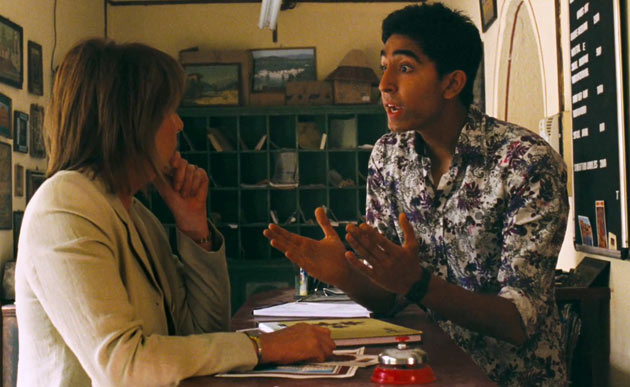|
The Best Exotic Marigold
Hotel
Reviewed
by
Damien Straker on
March 19th, 2012
Fox presents
a film directed by
John
Madden
Screenplay
by
Ol Parker, based on the novel 'These Foolish Things' by
Deborah Moggach
Starring:
Judi
Dench, Tom Wilkinson, Bill Nighy,
Maggie Smith, Dev
Patel, Penelope Wilton, Celia
Imrie and Ronald Pickup
Running
Time:
120 mins
Rating:
PG
Released:
March 22nd,
2012
|
8/10
|
|
A group of elderly British men and women travel to India
together
to stay in the Marigold Hotel. Evelyn (Judi Dench) is a widow who has
never had
a job of her own and is looking for employment overseas to pay off her
husband's debts. Graham (Tom Wilkinson) is a judge who has retired and
is
looking for someone he once knew in India. Douglas (Bill Nighy) and his
stubborn
wife Jean (Penelope Wilton) have moved overseas because they are
dissatisfied
with the residency they've been put into after losing their money.
Madge (Celia
Imrie) and Norman (Ronald Pickup) are both looking for love but he
strongly prefers
the younger options. Muriel (Maggie Smith) is a former housekeeper and
racist
in need of a hip operation. The hotel they are staying in is falling
apart,
buoyed only by the enthusiasm of its owner Sonny (Dev Patel), who is
trying to
court a girl working in a call centre, much to the disapproval of his
mother.

The Best Exotic Marigold Hotel postures as a 'fish out of water' movie but surprises us
with its
sensitivity and appreciation for characters instead of broad
personalities. Initially
it seems as though these will be caricatures and familiar archetypes
but growth
is provided in sensible, mature scenes that ensures that the film does
not have
to resort to no-brainer slapstick or obvious humour to be engaging. The
film
cleverly aligns us with the expectations of the characters and then
subverts them
for both parties. Various relationships are not sown back together in
the end
and some seemingly predictable romances do not blossom like we've been
conditioned to think that they will. Instead, the main characters are
all
collectively linked by their age and a feeling of redundancy in life.
There are
intelligent scenes, like the one where Evelyn gives a demonstration in
a call
centre to show her social experiences, which restore each of the
characters
feelings of self-worth. We're told intelligently and optimistically
that:
"Everything will be alright in the end and if it's not, it's not the
end". What's equally pleasing about the screenplay is the way that it
reveals character backstories, through the dialogue, so that we can
sympathise
with almost everyone in the film and in fresh ways too. Perhaps the
richest of
these is Tom Wilkinson's Graham, who grew up in India as a child and
has a
secret that is actually quite affecting. When he returns to an area
that he
thought he knew he discovers that many of the houses have now been
removed.
It's a metaphor for his disconnection but also the limitations of his
lifespan
too. Arguably, if this was a Hollywood film I don't think we would have
these
kinds of poignant details. Aside from its humanity, the film is also
strikingly
funny thanks to the deft British wit that is frequently hilariously and
ironic.
When Douglas' prudish wife says that she doesn't know how they're going
to
celebrate their 40th anniversary, another character chimes in to say:
"Perhaps a moments silence?" The entire cast, some of which are given
some fairly unglamorous roles, are smart and charismatic. Even Dev
Petal, who at
first seems like a token Indian stereotype, develops his role into
someone
battling feelings and desires against personal conflict. India itself
is
another great character in the story. As you would expect, filming on
location
means that we fully obtain the country's vibrancy, colour and people,
with
crowds of bodies constantly in motion on screen. Although on the
outskirts the
film might seem like a light, breezy comedy, I think people are going
to
surprised by how much attention has been given to the humanity as much
as the
jokes. The writing is that impressive.
|